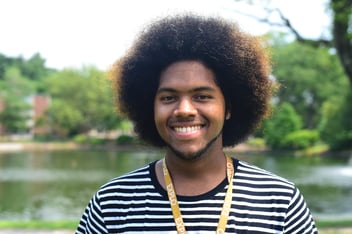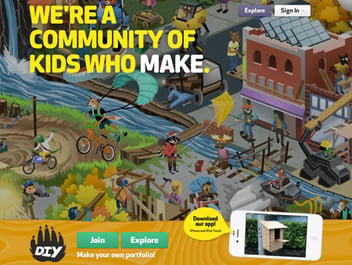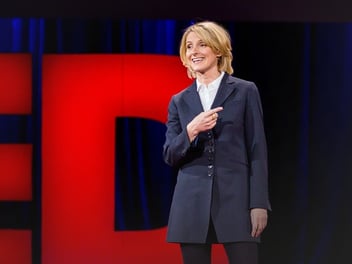George Whitesides Has a Ticket to Ride

George Whitesides [Explo Student '87-'88] is working to make space travel, and space civilization, a reality.
George Whitesides [Explo Student '87-'88] has a ticket to ride a rocketship.This is not a ‘hypothetical’ ticket on a ‘speculative’ rocketship for an ‘undetermined’ date. Whitesides’ ticket is for the rocket SpaceShipTwo. In 2009, his flight (not ‘launch’ but, yes, ‘flight,’ complete with runway takeoff and landing) will leave from Mojave Spaceport in California. Roughly two and half hours later, it will land in New Mexico.
And on that day, Whitesides, along with his wife and four other passengers, will experience things that until now have been reserved solely for scientists and professional astronauts: the force of four G’s of rocket fuel at his back, a climb through the atmosphere, weightlessness in zero-gravity…a view of Earth, the moon, and the sun from outer space.
“We bought a couple tickets on Virgin Galactic,” Whitesides says. “It’s for our honeymoon.”
Whitesides, it must be said, is not just any Joe with an office job and a boyhood fascination with outer space. He was the Executive Director of the National Space Society (NSS), the country’s largest space advocacy organization, with more than 50 chapters and 20,000 members. As the head of this Washington-based group, Whitesides gave key-note speeches, meets with congressmen, is quoted in virtually every space-related news article put to press, and generally advocates for the NSS’s mission: to expand civilization beyond Earth, to settle space, and to use its resources carefully and for humanity’s betterment. He also worked for NASA and served a key role in the inaugural Obama administration
The spaceship Whitesides will be flying in is the world’s first commercial spacecraft and is the handiwork of Burt Rutan, designer of the SS2 and one of the world’s premier rocket scientists, and Richard Branson, the British entrepreneur whose Virgin Group bought the design and made it a part of its air fleet.
The aircraft itself consists of two parts – a mothership the size of a 757 and the 60-foot SS2, which the mothership (called the WhiteKnight) carries on its underside. The WK takes off from a traditional runway and climbs to 50,000 feet, at which point it releases the SS2 into freefall. The SS2’s hybrid motor then ignites, accelerating the rocket at the aforementioned four G’s to a velocity around one kilometer per second – or roughly three times the speed of sound.
With this burst, the rocket exhausts its fuel supply and coasts to its ascent at a suborbital level in space. It is at this point that Whitesides and the others aboard, looking out the SS2’s 15 floor, ceiling, and wall windows, will experience a view of the Earth only seen in school textbooks and science museums.
“What’s exciting is that it finally looks like regular people are going to start flying in space,” Whitesides says. “That is going to fundamentally transform humanity’s relationship with space. We’ve gotten conditioned to the idea that only astronauts go, or scientists, or the super-rich. Somewhere along the line, the government forgot that people’s real interest in space is going themselves.”
The possibility of this – space travel for the masses – seems to most people remote and far-off, at best. At worst, it’s looked at as fanciful, dangerous, expensive, and irrelevant to the contemporary political discussion. Whitesides, aware of this, describes interest in the cosmos as “a mile long and an inch deep.”
Whitesides and many others in the field of space exploration envision and predict a future where humanity will rely on space’s resources – minerals found on nearby celestial bodies, as well as its physical area – in order to sustain an expansive human population with finite and dwindling terrestrial resources. Far from an opportunity to exploit the great beyond, the new reality of space travel is, for Whitesides, a chance to consider humanity’s future and actively craft it.
“At a certain point,” Whitesides says, “we’re going to reach a tipping point for going to space—because it’s cheap enough, because they find something that’s like gold there, for whatever reason. The more we can do now in terms of asking the question, ‘As we go out, what do we want to bring with us?’ – that to me is the most interesting question.”
george whitesides at explo
In his first summer at the Explo, Whitesides didn't ever want to leave. So for his second summer, he became a residential student so he didn't have to.
"I remember as a day student, you could stay late – like until 10:00 – and I would stay until 10:00 every night, " he says. "I did one summer as a day student and then came back the next summer as a residential student. It was just amazing."
In his two summers at Explo, Whitesides took a mix of arts and science courses. By age eleven, Whitesides says, he knew he wanted to go to outer space, but he embraced the chance to explore new interests.
"My parents allowed me to do [Explo] because it was special," Whitesides says. "It wasn't just camp – it was dedicated to expanding your mind and enabling you to do all these other things, whether it was art or music or political discussions."
For Whitesides, this tenet of the Explo mission – exploring new ideas at a young age – is key to the lasting impact of the Program.
"You've got to catch people [when they're young], which is why Explo is so important, so critical," he says. "It's a great way to get kids, like in my case, excited about science and technology issues. There are just fantastic people there who are able to share that. For me, it was really one of the most joyous times of my life."



